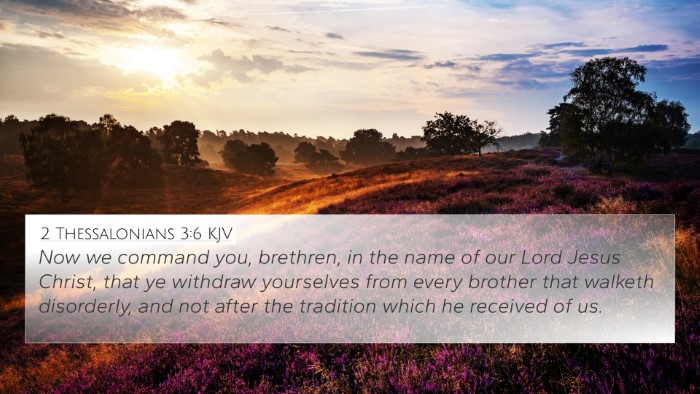Understanding 2 Thessalonians 3:7
The epistle of 2 Thessalonians, authored by the Apostle Paul, addresses various concerns related to the church in Thessalonica, particularly concerning issues of work ethic and the conduct of believers. In 2 Thessalonians 3:7, Paul emphasizes the importance of living an exemplary life, stating:
"For yourselves know how ye ought to follow us: for we behaved not ourselves disorderly among you."
Verse Meaning and Interpretation
The verse carries significant implications regarding Christian conduct and leadership. Paul, as a leader, sets an example for the members of the church, showcasing the need for a disciplined and respectable lifestyle.
Commentary Insights
-
Matthew Henry's Commentary:
Henry points out that Paul appeals to their own knowledge and experience of his conduct during his time with them. This is a reminder that leaders must live as examples, reflecting the teachings of Christ, thus inspiring others to follow suit.
-
Albert Barnes' Notes:
Barnes highlights Paul’s assertion that he did not behave in a disorderly manner. This could be interpreted as a call for the community to reflect on their own behaviors, urging them to align their lives with the teachings and example set forth by Paul and other leaders.
-
Adam Clarke's Commentary:
Clarke elaborates on the concept of "disorderly" living, noting that it encompasses idleness and a lack of commitment to work. The exhortation serves as an admonition against laziness and a call to productive living within the context of community.
Thematic Connections
The verse connects to several broader themes in the Bible, emphasizing themes of leadership, accountability, and communal integrity in Christian discipleship. The following cross-references provide further insight into similar messages found throughout Scripture:
Cross-References for 2 Thessalonians 3:7
- 1 Thessalonians 2:10-12: Paul reminds them of how he and his companions conducted themselves among them, living blamelessly.
- Philippians 3:17: Paul encourages others to follow his example and observe those who walk according to the pattern he set.
- 1 Peter 5:3: An admonition to leaders not to lord over others but to be examples to the flock.
- 2 Timothy 3:10: Paul contrasts his own conduct with the behavior of false teachers, reaffirming the importance of a good example.
- Titus 2:7: Paul instructs Titus to show himself as a model of good works in every respect.
- Hebrews 13:7: Encouragement to remember the leaders and to consider the outcome of their way of life.
- Romans 14:7-8: The emphasis that our lives are to honor God, as we belong to Him in life and death.
Conclusion
In conclusion, 2 Thessalonians 3:7 serves as a powerful reminder of the impact of personal conduct within the Christian community. Through understanding this verse and its connections with other scriptures, believers can better grasp the importance of embodying a Christ-like example and fostering a community characterized by productive and godly living.
Further Reflections
Reflecting on how we live and relate to others in our spiritual communities is crucial for growth. By cross-referencing these insights and applying them, we can enhance our discipleship and the witness of our faith.
Keywords for Further Study
- Bible verse cross-references
- Connections between Bible verses
- Linking Bible scriptures
- Comparative Bible verse analysis
- Bible verses that relate to each other
- Cross-referencing Biblical texts
- Thematic Bible verse connections
- Bible verse parallels
- Scriptural cross-referencing
- Inter-Biblical dialogue
- Tools for Bible cross-referencing
- Bible concordance
- Bible cross-reference guide
- How to use Bible cross-references













